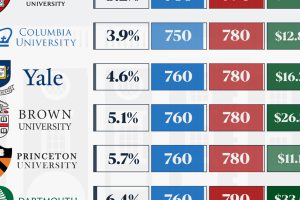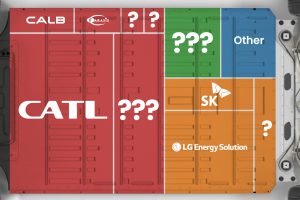Automakers’ Adoption of Fuel-Saving Technologies
Over the past few decades, automakers have invested plenty of time and money into various fuel-saving technologies. This includes innovations such as direct injection, cylinder deactivation, and auto start-stop features.
Keeping track of which companies have adopted these technologies can be difficult. Thankfully, the EPA’s 2022 Automotive Trends Report includes data that shows which automakers have adopted what technologies.
Understanding the Data
The percentages in this infographic show how 14 major automakers have adopted various fuel-saving technologies into their lineups. The report did not specify if this data is for North American models only.
| Brand | Turbo | Direct Injection | Cylinder Deact. | CVT | 7+ Gears | Start-Stop | Hybrid | PHEV/EV/FC |
|---|---|---|---|---|---|---|---|---|
| Subaru | 22% | 99% | 0% | 95% | 0% | 80% | 0% | 0% |
| Nissan | 5% | 72% | 0% | 87% | 12% | 0% | 0% | 1% |
| Honda | 53% | 79% | 25% | 61% | 38% | 24% | 7% | 0% |
| Mazda | 27% | 100% | 45% | 0% | 0% | 0% | 0% | 0% |
| Toyota | 3% | 0% | 0% | 36% | 38% | 19% | 22% | 2% |
| Kia | 26% | 47% | 0% | 42% | 45% | 50% | 2% | 0% |
| Hyundai | 18% | 44% | 0% | 23% | 46% | 21% | 4% | 2% |
| BMW | 99% | 99% | 0% | 0% | 98% | 64% | 25% | 7% |
| Volkswagen | 77% | 94% | 3% | 0% | 90% | 71% | 20% | 7% |
| Mercedes-Benz | 94% | 100% | 8% | 0% | 100% | 77% | 22% | 0% |
| Tesla | 0% | 0% | 0% | 0% | 0% | 0% | 0% | 100% |
| Ford | 80% | 56% | 21% | 2% | 92% | 83% | 5% | 3% |
| GM | 37% | 91% | 54% | 9% | 74% | 75% | 0% | 1% |
| Stellantis | 13% | 10% | 22% | 1% | 96% | 45% | 15% | 3% |
There are several geographical trends hidden within this dataset. To make them more obvious, we color-coded the 14 automakers by their nationality.
Asian Automakers
Starting from the top of the graphic, we can see that Japanese automakers are big proponents of gasoline direct injection (GDI) engines, as well as continuously variable transmissions (CVT).
With a GDI engine, fuel is injected directly into the combustion chamber at high pressure. This is more precise than the traditional method known as port injection, which results in greater fuel efficiency and lower emissions.
CVT transmissions use pulleys instead of gears to improve fuel efficiency. CVTs are best paired with smaller, lower output engines, which may explain why Japanese automakers (who have a history of building smaller cars) have adopted them so widely.
Note that Toyota is listed as having 0% adoption of direct injection, but this isn’t exactly true. The automaker uses its D4-S system, which is a combination of both port and direct fuel injection.
South Korean automakers, on the other hand, have a more balanced technology profile, adopting a wider number of technologies, but each to a lesser degree.
German Automakers
German automakers are well-known for their expertise in building combustion engines, so it’s no surprise they use turbocharging and direct injection in nearly every model.
They’ve also heavily adopted high gear-count transmissions (7 or more gears), which can not only enable better fuel efficiency, but also faster acceleration. The downside to these transmissions is that they can be very heavy and complex.
Furthermore, German automakers utilize the auto start-stop feature in many of their vehicles, and are tied with Toyota in terms of hybrid adoption.
American & Other Automakers
Ford and GM’s technology profile is similar to the Germans, using turbocharging and direct injection combined with 7+ gear transmissions.
GM uses turbocharging less frequently, but stands out with its high usage of cylinder deactivation technology, at 54% of models. Referred to by GM as Active Fuel Management (AFM), this feature shuts down half of the engine’s cylinders during light driving.
GM is known for its small-block V8 engines, which can be had in many of the company’s models. Given the high cylinder count of a V8, AFM is a clever trick for improving fuel efficiency.
Stellantis, which is a merger between Italian-American Fiat Chrysler and French Peugeot, has not widely adopted many technologies except for the 7+ gear transmission.
Finally there’s Tesla, which does not use any of the aforementioned technologies due to it being a pure electric automaker.
Going The Way of the Dinosaur
The technologies shown in this infographic have helped to bring the average mpg of a new car to record highs in recent years.
Many of these innovations could become obsolete as automakers slowly phase out gasoline engines. In 2021, six major automakers including Ford, Mercedes-Benz, and GM pledged to phase out the sale of new gasoline and diesel-powered cars by 2040.
Other companies such as Porsche believe that the combustion engine still has a future, pointing to synthetic fuels as a means of significantly reducing CO2 emissions.





